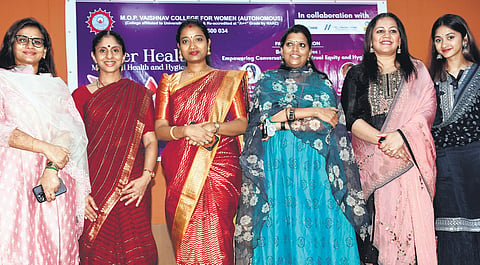

CHENNAI : When journalist Kavitha Muralidaran visited Koovalpuram in Madurai, to look into the famous ‘guest houses’, she entered into a world of normalised menstrual isolation. “Koovalpuram and four other villages in Madurai practice isolating women into such guest houses. During periods, they have to stay at these places. The visit was in 2020, just before Covid,” she said, highlighting the taboos around menstrual health, at a panel discussion at MOP Vaishnav College for Women on Tuesday.
The discussion with the theme ‘Breaking Taboos: Empowering Conversation on Menstrual Equity and Hygiene’ was conducted as part of the college’s Her Health Menstrual Health and Hygiene Expo. The event, organised in association with HLL Lifecare Limited, was inaugurated by Priya Rajan, Mayor of Chennai. The New Indian Express was the print partner.
Kavitha said, “During the Gaja cyclone in 2018, a teenage girl died because she was isolated in a hut. Practices like this can take one’s life. The idea of staying in one room while you are menstruating is problematic. The guest houses in Madurai didn’t have toilets. A woman told me that even a district collector must follow that rule there.”
The panellists spoke about the necessity of talking about periods and sexual wellness at a very young age. Dr Saranya Jayakumar, educational psychologist and child rights activist, shared, “I have seen girls using dried leaves instead of menstrual napkins in villages. They don’t have access to inner wear. I came to know that some children in the villages I have visited, started to wear clothes or any outfit only when they were almost 13 years old. Even if people have access to sanitary products, getting a few of them educated on menstrual hygiene is difficult. The first step is to break that reluctance.”
Dr Priya Ravichandran, IAS officer, shared her experiences of dealing with menstruation. “The concept of menstruation was different when I was young. We weren’t supposed to discuss it with anyone. When you see the blood stains for the first time you panic. I remember weeping after getting my first period,” she shared, adding that periods being a taboo makes it more difficult for everyone as it means neglecting one’s health.
Dr Priya Selvaraj, gynaecologist and fertility expert, said, “Children’s knowledge about menstrual hygiene and sexual health should begin from their homes and schools. Reading the book Let’s Talk About the Birds and the Bees made me understand topics like how babies are made, puberty, and healthy relationships at a young age. Kids should be educated about the basics like vaginal health and vulval health in schools.”
Archana Chandhoke, anchor, put forward the need for a sensible disposal system while Zaara Vineet Chandoke, VJ and social media influencer, stated that there is an immediate need for sanitary pad machines in schools and colleges.
Writer and poet Audre Lorde once said, “I am not free while any woman is unfree, even when her shackles are very different from my own.” Quoting her words, Kavitha shared that all women should amplify the voices of others, especially while discussing their struggles as a woman. She said, “I don’t support the view that we should be the voice of the voiceless as they take away the original voice. Instead, we should amplify their voices.”